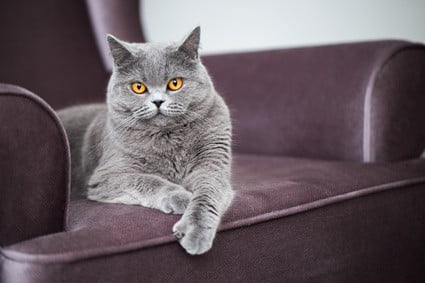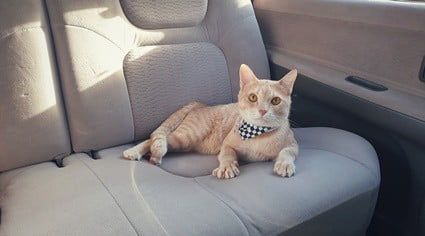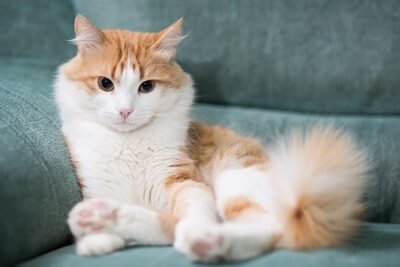You’re sitting in your favorite chair when you need to get up to attend to something important. As soon as you move, your cat steals your seat. You return, and it looks like your cat has been asleep there for hours.
Cats will take a seat that is warm from where you’ve been sat. Cats love to be warm and will absorb your body heat. Cats also enjoy being close to their owners’ scent because it makes them feel safe and comfortable. Territorial cats will jump into the seat to claim it as their own and warn other animals off. Your cat might also want to get your attention or cuddle up next to you when you return home.
When your cat jumps into your seat, it’s actually a compliment. In most cases, it wants to be close to you and feels safe due to your scent. However, these aren’t the only reasons why your cat takes your seating position.
Why Does My Cat Jump in My Chair When I Get Up?
Cats love getting cuddled up in a soft, comfy seat, but it’s inconvenient when they decide that your seat is the one they want. Most owners can’t bear to move their contented cats from their new sleeping space and will relegate themselves to another seat. Why are cats so eager to jump into your chair as soon as you move?
Seat is Warm
According to the Journal of Physiology, cats can respond to the differences between warm and cool temperatures. A cat’s paws are susceptible to temperature changes.
As descendants of the African wildcat, cats crave warmth. Cats have an average body temperature of 102 degrees Fahrenheit, compared to 97.5 degrees for humans. Most domestic cats are hardwired to adapt to warmer climates. Those that live in colder areas develop thick, fluffy fur to survive, which traps the heat and keeps them warm.
However, most domesticated cats rely on external heat sources to stay warm, which they sometimes get via our body heat. Because heat has been transferred from our body to the seat after a long time sitting, cats can sense the warmth and move there to take advantage.
Interestingly, because a cat’s fur is insulating, it can prevent the animal from realizing it’s too hot. As our body heat dissipates from the seat very quickly, it won’t cause a problem.
Marking Territory
Cats produce many different scents to communicate messages to other felines. They also find their own scent reassuring. A cat will jump on your seat to deposit its scent, making the chair smell more familiar and the environment more comfortable.
If you have other cats in the house, this process shows dominance and allows a cat to mark its territory to warn all other animals off.
Your cat may also steal your seat over and over again. While this can be frustrating if you’re comfortable, don’t take it personally. Your cat is taking your chair because it’s reapplying its scent as it fades. Cats like to know their scent is present, even if they are elsewhere in the house.
Also, don’t be surprised if your cat stays in its new seat for a long time without moving. Cats will spend a significant amount of time in one place to make sure the area smells like them. Sitting there for longer ensures a stronger smell.
Chasing Your Scent
Cats are guided by their sense of smell, which is around 14 times stronger than that of humans. Cats also have 200 million scent receptors that pick up on smells that we can’t detect. Your smell can help a cat feel comfortable and relaxed and many cats enjoy being close to their owners’ scent.
Cats also have a dual scent mechanism. This consists of the regular olfactory receptors, which pick up scents in the air. It also includes a second nose called the vomeronasal organ, otherwise known as the Jacobson’s organ. This organ picks up pheromone signatures that most other animals can’t detect.
According to Oncoscience, a cat’s well-developed olfactory bulb also helps give it an acute sense of smell. These pheromones allow cats to recognize their owners. When an owner moves out of their seat, a cat can easily detect these unique pheromones and sit in the same spot closer to the comforting scent.

Wants A Reaction
Cheeky cats like to push boundaries and will stop at nothing to get your attention. If you offer a positive reaction with strokes and hugs after your cat has stolen your seat, it will remember this and attempt to take your spot more often.
Similarly, if your cat understands that stealing your seat earns it a cuddle, it will do so to get close to you, not only for affection but for your body heat.
Some cats also see this as a fun game and will jump into your seat to initiate playtime. If your chair is made from a soft fabric, be careful when playing with your cat because its claws can make holes and pull strands from the material.
Feels Safe
By sitting in your seat, you’ve personally marked it as safe. From this, cats see that this rest area is defensible and will settle down to sleep knowing they’re not at risk of harm.
This stems from when cats were wild and needed to protect themselves from predators. While cats are predominantly predators, injured, vulnerable, or small felines make easy prey for larger animals.
So when your cat hops into your seat, it’s really a compliment. Your pet feels safe enough to puts its guard down, knowing that it is protected without fear of a surprise attack. Your cat is part of your family’s pack, and it can sense this is the case.
When Is A Cat Taking Your Chair A Problem?
Most of the time, your cat is acting innocently when it takes your seat after you get up to do something. However, it can sometimes indicate that something isn’t quite right mentally or physically.
Cats that are stressed or attempting to get their owners’ attention may have a physical or mental issue. Here are some reasons why stealing your seat is a problem:
Depressed
Depression or sadness in cats is a genuine cause for concern. When a cat suddenly goes quiet, a range of issues can be to blame. Changes in personality, poor grooming, and low, mournful meows are signs that your cat feels blue.
Some depressed cats become clingy and aim to be around their owners constantly for comfort and reassurance. By jumping into your seat, sad cats have an easy way to get close to you, especially if you’re likely to squeeze in next to your cat. They also find reassurance in your scent.
If you notice your cat has started jumping into your seat every time you get up, check for signs of sadness:
- Changes in vocalization
- Poor body language
- Aggression or fear
- Hiding
- Increased clinginess
- Excessive sleep
- Loss of appetite
- Excessive scratching
Behavioral Issues
Some cats steal their owners’ seats because they are naughty. Cats have a range of personalities, and some love to push their luck. While many cats are only playing when they jump into your seat, some are being disruptive.
Boredom is often to blame. If your cat lacks mental or physical stimulation, it will display a range of destructive behaviors to rid itself of excess energy and get attention from you. The more attention you give it, the worse your cat will behave in the future.
The next time your cat jumps into your seat, ignore it. Let it have the chair and keep yourself clear of the bad behavior. In time, your cat will understand that there’s no reward for acting up or stealing your chair.
Cat Attacks You
Cats are territorial creatures. If they’ve claimed your seat and now see it as their own, they may attack you when you attempt to take it back by scratching or biting you.
The best way to stop your cat from attacking you is to ignore it when displaying naughty or aggressive behaviors. Walk away from your cat so that it understands that you’re not impressed.
Similarly, if you’ve woken your cat to take your seat back, it might react instinctively because it feels that it is being attacked as a prey animal.
Cats in the rapid eye movement (REM) stage of sleep shouldn’t be disturbed, as this is the period where they’re most likely to dream. Waking them before they’re ready confuses your cat and leaves you at risk of injury.
If your cat goes into a deep sleep after taking your seat, it’s best to leave them be and find somewhere else to sit.

How to Stop Cat Stealing Your Seat?
There may be times when you want to prevent your cat from sitting in your seat altogether. Perhaps your chair is new, or you have guests over, for example. Cats are drawn to furniture, especially if it contains your scent. However, you can make your furniture less appealing by following these steps:
Discourage Sitting
You can prevent your cat from jumping into your seat by placing something on it each time you get up. This could be a blanket you know your cat doesn’t like or anything else that would block your scent and discourage your cat from getting comfortable. You might feel mean for doing this at first, but your cat will learn that your seat is off-limits.
Give Your Cat an Alternative Seat
By providing a more comfortable and better-positioned seat for your cat to move to, it will likely leave yours alone. Your cat might be happy with a proper cat bed or a cozy spot you make for it.
To encourage your cat to move to this new seat, place down a blanket or piece of clothing that smells like you. Cats that want to get close to your scent or mark its territory will be drawn to your pheromones and are more likely to let you keep your seat.
Reposition Your Cat
If all else fails, you might have to revert to the tried-and-tested tactic of removing your cat each time it jumps into your seat. As long as it’s not in a deep sleep, it’s safe to do so. While your cat might not be too impressed, it will stop trying once it realizes that the attempt at claiming your seat is futile.
If you want to cuddle up to your cat, encourage it to sit on your lap instead. That way, you can both enjoy some quality time together without losing your comfortable seat.


Very interesting! I wondered why my cat would jump into whichever chair I’d been sitting in. I’d pet and play with him for a few minutes, then he jumps back out. Now I know why because of your article. Thanks!